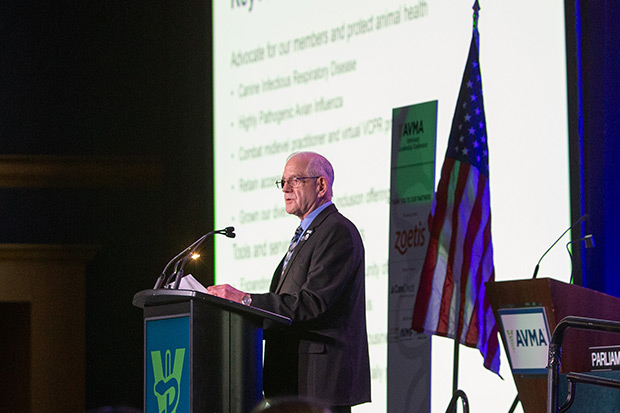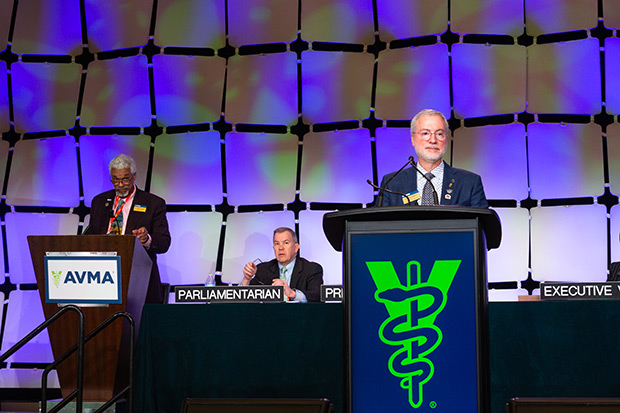Delegates approve new polices on biosecurity, license by endorsement

Delegates approve new polices on biosecurity, license by endorsement
By Malinda Larkin and R. Scott Nolen
The AVMA House of Delegates (HOD) approved seven resolutions on January 11 during its regular winter session, held in conjunction with the AVMA Veterinary Leadership Conference in Chicago.
Most of the resolutions were updates to Association policies that the AVMA Board of Directors (BOD) referred to the HOD, including those on pet ownership, velveting, and integrative veterinary medicine.
Member dues
Beginning in 2026, membership dues will increase by $20, followed by $15 annual increases through 2030 at the discretion of the BOD.
Dr. Jon Pennell, AVMA treasurer, said that upon reviewing AVMA membership dues over three decades, the latest increase essentially equals what the annual Consumer Price Index (CPI) increase would have been, allowing the Association to make up for past years' periodic increases that fell short.
Historically, the Association has raised membership dues on an intermittent basis as needed to align the budget with inflation-tied increases in operating expenses. If dues had remained unchanged, the projected net income for the Association would have been: -$1.4 million in 2026, -$2.6 million in 2027, and -$3.5 million in 2028.
Historically, the Association has raised membership dues on an intermittent basis as needed to align the budget with inflation-tied increases in operating expenses. If dues had remained unchanged, the projected net income for the Association would have been: -$1.4 million in 2026, -$2.6 million in 2027, and -$3.5 million in 2028.

The Board introduced the dues increase as a resolution to the HOD, and the House Advisory Committee (HAC) recommended approval of the resolution. Delegates passed the measure with 99.5% approval.
The HOD last approved a dues increase in 2019 that allowed for a $30 increase in 2020, followed by optional $10 increases in both 2021 and 2022. However, a $10 increase was only implemented in 2022 as the Board opted to forgo an increase the year before.
Officer campaign rules
Amendments that the HOD approved to the rules for AVMA officer election campaigns include limiting campaign expenses to $10,000 per candidate, excluding transportation and personal meal costs, and clarifying the appeals process in the case of rules violations.
The changes to the rules for AVMA officer election campaigns were presented by the HAC and endorsed by the BOD. As the HAC explained in background materials, the amendments were based on a thorough review of the rules by a HAC working group and the Board.
The new officer campaign rules take effect at the close of the HOD’s regular annual session this July in Washington, D.C.
Biosecurity
Delegates adopted a policy on biosecurity declaring the AVMA’s support for science-based programs and best practices to protect animals from threats of disease. The House passed the new policy accompanied with a request to the Board that a resource page on biosecurity be developed and maintained on the AVMA website.
The new policy reads as follows:
“Diseases of animals can be transmitted in many ways, including direct and indirect routes, oral, airborne, and vector borne routes of transmission.
Because of these many risks, prevention of disease transmission through the practice of biosecurity is critical to protecting the health and welfare of all species.
To be effective, biosecurity programs should be based on available scientific evidence and current best practice(s) as applicable.
The AVMA supports the protection of the health and welfare of animals through the practice of science-based biosecurity and encourages its members to become familiar with this approach.”
Eleven state and species associations represented in the HOD cosponsored the policy. Delegates debated nuances of its wording, but ultimately reached agreement.
“We shouldn’t let the perfect interfere with the good,” said Dr. Joseph Annelli, National Association of Federal Veterinarians alternate delegate. “With an H5N1 pandemic looming, we don’t have time to postpone this. We need to start working on best practices now.”
Velveting
Delegates voted in favor of revising the AVMA’s policy that addresses the removal of cervid antlers in velvet to indicate that this practice should be discouraged if performed for nontherapeutic purposes.
The updated policy was submitted to the House by the BOD following a policy review by the AVMA Animal Welfare Committee (AWC).

Products from the velveting process are used to produce a supplement for human use, according to background materials. The drug residue status of products from velveting, when appropriate pain management is used, is unknown and the AWC recognizes the need for research in this area to ensure safety, it added.
Delegates from the Society of Theriogenology and the American Association of Small Ruminant Practitioners spoke in favor of the policy, clarifying it doesn’t refer to “hard” antler removal, which is a necessary practice to prevent injury from aggressive animals or animals in confined spaces.
Pet ownership guidelines
The House adopted an updated policy that emphasizes inclusivity when addressing pet ownership, highlighting the many ways veterinarians help pet owners across all income levels, cultures, and communities to optimize care for their animals.
The BOD submitted the revised policy to the HOD after the Steering Committee on Human-Animal Interactions (SCHAI) reviewed and made changes based on feedback from AVMA members.
“Member comments focused on how aspects of the policy, specifically ‘pets are a privilege’ and the term ‘responsible,’ should be re-evaluated through the lens of diversity, equity, and inclusivity,” the background materials state. “Significant effort was taken to adjust the tone of the policy to be primarily supportive and focused on the human-animal bond.”
Among the policy’s several recommendations to pet owners are the following:
- Provide lifelong care for the pet or make reasonable efforts to transition care of the animal to another individual or group. This means committing to ensuring your pet's care for their entire life.
- Select pet types and numbers that are suited to your lifestyle.
- Establish and maintain a veterinarian-client-patient relationship.
- Provide preventive (e.g., vaccinations, parasite control) and therapeutic health care for your pet(s) in consultation with, and as recommended by, your veterinarian.
Integrative veterinary medicine
Delegates also approved a more streamlined policy on integrative veterinary medicine developed by the Council on Veterinary Service (CoVS) and submitted as a resolution by the BOD.
Integrative veterinary medicine is a comprehensive approach to animal health care that joins conventional veterinary practices with complementary and alternative therapies, such as acupuncture and chiropractic care.
The resolution recommended shortening the policy’s content to simply state that integrative veterinary medical modalities should be held to the same standards as traditional medical therapies as highlighted in the AVMA Principles of Veterinary Medical Ethics and the AVMA Model Veterinary Practice Act. Definitions were also added, which are as follows:
- Complementary: Non-traditional medicine used together with conventional medicine.
- Alternative: Non-traditional medicine used in place of conventional medicine.
- Integrative veterinary medicine: The coordination of complementary, alternative, and conventional veterinary medicine.
During the House’s deliberation on the resolution, Dr. Ashley Rossman, the American Holistic VMA delegate, told the assembly that the organization supports the resolution.
Licensure
The House adopted a new policy on license by endorsement following work by the CoVS to further clarify options for reducing barriers to licensure in multiple states.
License by endorsement is a process that allows someone to apply for a license in a new state or territory based on their existing license in another state or territory. The CoVS believed a stand-alone policy on license by endorsement could help with related regulatory efforts and the BOD agreed, submitting the policy to the House for its approval.
The policy says, in part, “The AVMA recognizes the need for mobility of veterinarians and veterinary technicians and encourages state authorities to adopt legislation and regulations that improve licensing portability, while protecting animal and public health. The AVMA also encourages the use of data-sharing programs between states to facilitate the efficient transfer of license information.
It goes on to say that the AVMA believes that an applicant should be qualified for license by endorsement if they:
- Have provided proof of a record of good standing for the state(s) in which they are licensed and have been previously licensed.
- Have acceptably completed state-specific jurisprudence testing, as determined by the state where licensure is being sought.
Cellular agriculture
The House voted against a resolution proposing the adoption of a policy on the role of veterinary medicine in advancing cellular agriculture.
Some delegates took issue with the sentence in the resolution that said, in part: “This technology enables the production of animal-derived foods and products without the need for conventional animal agriculture, thus mitigating its associated environmental impacts, reducing the risk of zoonotic diseases, antibiotic resistance, and advancing humane treatment standards.”
Dr. Susan Chadima, Maine alternate delegate, noted this is an emerging technology about which there are still many questions. “I think this is a timely subject for us to be considering and using our resources to add to the conversation, wherever that will be,” she said.
Dr. Kate Barger Weathers, American Association of Avian Pathologists delegate, said talking about cellular agriculture is too limited in scope.
“There’s so much that’s happening with agriculture technology, particularly gene editing. That’s where AVMA needs to have a seat at the table in the wider scope of genetic engineering,” she said. “There are other tools that can help us advance food security, animal welfare, environmental stewardship, and finally, the global food supply chain. We can’t simply focus on one technology and think that is the solution.”
A House reference committee recommended that the Board consider further exploring the role of veterinarians in cellular agriculture with an update to be provided during the 2026 HOD winter session.
Appointments
Finally, delegates elected two council members in January, while the Board appointed one committee member.
The House elected Dr. Yung-Yi Mosley, Tifton, Georgia, to the AVMA Council on Biologic and Therapeutic Agents, representing immunology. The HOD also elected Dr. Jennifer Glass, Buhl, Idaho, to the AVMA Council on Veterinary Service, representing private mixed practice.
The BOD appointed Dr. Daniel Morin, Livonia, Michigan, to the AVMA Steering Committee on Human-Animal Interactions, as an alternate expert on the impact on the human on the human-animal bond (i.e., how human-animal attachment type and strength impact the wellbeing of people).
Source: https://www.avma.org/news/delegates-approve-new-polices-biosecurity-license-endorsement
